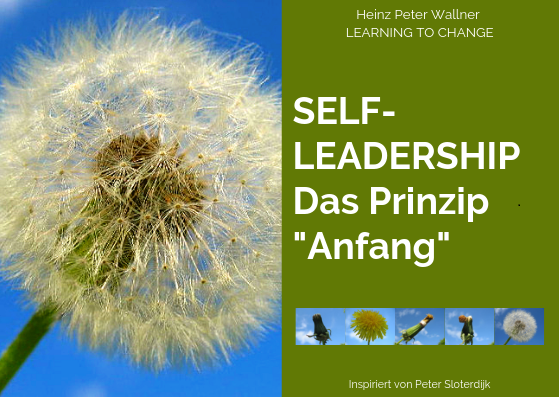This post is also available in: German
Selfleadership needs a beginning
Personal development is based on some basic principles. One of these is the “beginning” principle. Tell me how your change project begins and I’ll tell you how it ends. Peter Sloterdijk has in his Frankfurt lectures „Zur Welt kommen – Zur Sprache kommen“ building blocks of a poetics of beginning compiled. Selfleadership and the beginning – or rather “the beginning” – are very closely connected.
Die Erfahrung zeigt wachen Menschen, dass im Beginn von Ereignissen deren Verlauf sich schon abzeichnet, weshalb sie jeden Anfang wichtig nehmen und mit Aufmerksamkeit betrachten. (freie Ãœbersetzung: Experience shows awake people that at the beginning of events their course is already apparent, which is why they take each beginning important and look at it with attention.)
(Rüdiger Dahlke)
Books without beginning and end?
Do you know Jorge Luis Borges‘ eerie tale of the Sandbuch? The story is about a holy book from India that has no beginning and no end. The reader who tries to open the first page cannot succeed because there is always another page opening up and no beginning can be found. The reader experiences the same when trying to find the end of the book. All attempts are doomed to failure. The book is like sand, which also has no beginning and no end, so they say. Peter Sloterdijk writes: „Ein Buch ohne Anfang und Ende ist für menschlichen Besitz ungeeignet, der Verstand gerät in Gefahr, sich ans Monströse zu gewöhnen und blättert einer zuviel in dem maßlosen Buch, so riskiert er, selbst zum Monstrum zu werden (freie Übersetzung: A book without beginning and end is unsuitable for human possessions, the mind is in danger of becoming accustomed to the monstrousness, and if one person leafs through the immoderate book too much, he risks becoming a monster himself)“ (Seite 33).
Start or start at the beginning?
In Selfleadership we are always challenged to start something new. But where shall we start? How far back do we go and what are we prepared to question? We can always start something new. But what makes us certain that this new beginning is the right one? Selfleadership does not want to encourage people to start at any point, it wants to motivate them to start consciously with themselves.
Carried by the flow of culture
Strictly speaking, our life has no beginning either, at least not a memorable one. We come into the world and are initially shaped by a “stream of tradition”. The beginning will become an “already started”. We are carried by a basic trust that we can dive into a bright and non-toxic stream and slowly come to our senses and – instead of really starting – just take over the relay.
Selfleadership and the takeover
We actively begin with our self-management when we consciously “come into the world” and take on the relay of responsibility. It doesn’t seem so important to me to start at the very beginning. I guess it’s more important to start with yourself. Peter Sloterdijk means: „Es besagt zunächst nicht mehr, als dass Menschen, um zu einer Welt zu kommen, etwas anfangen müssen – ohne eigenes Anfangen keine Welt“ (freie Ãœbersetzung: At first it does not say more than that people, in order to come to a world, have to start something – without starting something there is no world) (Seite 119). In order to become a “subject” and begin the adventure of life, we must take an initiative.
What does that mean for a leader?
Selfleadership needs a beginning. You can set this start at any time. But do not confuse this with “taking yourself seriously from now on” or “acquiring something extra”. Starting with “oneself” means to consciously expose oneself to the whole leadership life, to start with oneself, to bring oneself to effect as a prototype, to start the way into the unknown new, to willingly take on the whole weight and the whole burden, to overtake oneself if necessary and to go to the limits. And in this way then willingly accept what becomes of myself. Beginning is therefore a release from the known and familiar, an initiative into the open.
best wishes,
Peter
To this article Peter Sloterdijk has inspired me once again. In this case it was the thought fireworks „Zur Welt kommen – Zur Sprache kommen“, Frankfurter Vorlesungen, edition suhrkamp, Band 505, 12. Auflage, 2017.
More about the principles of change: See the book “Colours of Happiness” von Dodo Kresse
Current articles about complexity and complexity training:
Teams als komplexe, adaptive Systeme
Komplexitätstraining und intuitive Entscheidungen
Freischwebende Aufmerksamkeit im Komplexitätstraining
Die Lösung der Aporie (Ambiguity)
Komplexitätstraining und Widerspruchsarbeit
Mehr zu meinem Führungskräftetrainings: LINK
My latest books:
Book2Look Bookwall: https://b2l.bz/s3fWaP
This post is also available in: German


